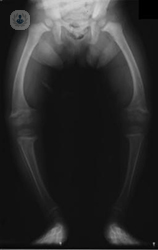Rickets: a case study of a young child with vitamin D deficiency
Escrito por:Rickets, which is often referred to as ‘the English disease’ was thought to be eradicated after the second world war, but recently it has started to make a comeback, with two known cases in the UK of children dying from this preventable disease, which is caused by vitamin D and/or calcium deficiency which prevents proper bone growth in children. It can also lead to heart problems and seizures if not treated.

Rickets case study
Dr Benjamin Jacobs, a leading consultant paediatrician with expertise in rickets, is treating a two-year-old boy who was diagnosed with rickets six months before. The boy’s mother started to notice that his legs were starting to bed outwards, and that they weren’t getting any better. As he was starting to walk, his left foot was bending inwards.
After consulting with Dr Jacobs, the boy was prescribed vitamin D supplements. This has stopped the increased bending of the legs, and caused them to become stronger, and slowly become straighter, though not completely straight yet.
Alongside the bowing of the legs, the boy’s ankle and knee joints also become swollen. Upon consulting x-rays of the boy’s legs, Dr Jacobs is able to see that at the end of the bones, where bone growth and development occurs, the bones don’t appear ‘clean’ and healthy, but rather frayed and ‘rotten’, which is a classical display of rickets.
Rickets and bone strength
Vitamin D deficiency causes the growth plate at the end of the bone to grow  irregularly and in a disorganised fashion. The growing part of the bone fails to calcify because of a lack of calcium and phosphate in the blood, this causes the bone to not grow properly, and the bone becomes short and deformed. Vitamin D is necessary for absorption of calcium and phosphate into the bones, to provide the ingredients for the ‘building blocks’ of the body to form.
irregularly and in a disorganised fashion. The growing part of the bone fails to calcify because of a lack of calcium and phosphate in the blood, this causes the bone to not grow properly, and the bone becomes short and deformed. Vitamin D is necessary for absorption of calcium and phosphate into the bones, to provide the ingredients for the ‘building blocks’ of the body to form.
Due to the malformation of the bones caused by rickets, it can cause the child to suffer with bone pain, and may not be able to walk or run for as long a period of time as other children. They may also suffer with a lack of energy.
Following the treatment of vitamin D supplements, the boy is able to run, jump, and play for much longer periods of time, as the bone pain is reduced.
Prevalence of rickets
Though not all cases are as severe as the boy featured in this case study, the number of cases of mild rickets is creeping up.
Getting enough vitamin D, known as ‘the sunshine vitamin’ is a challenge for many children in the UK. The recommended amount of vitamin D intake per day is 10 micrograms. Around 2 or 3mcg are found in a usual diet, so people are required to either make vitamin D naturally from sunshine, or taking it as a supplement.
During the months of November, December, January, February, and even March in the UK it is difficult to find enough sunshine to naturally create vitamin D, so parents are required to either give their children supplements, or use foods that are artificially fortified with vitamin D.
When do you need vitamin D the most?
Vitamin D is really important at stages when children are growing fast. This includes young babies, children going through growth spurts during puberty, pregnant women, to ensure they get enough vitamin D for their own health and for the health of the baby, and elderly people also often lack vitamin D.
Vitamin D deficiency is also more common in people with darker skin, as the skin doesn’t absorb as much sunshine, and in people who dress modestly and cover their skin with clothes at all times will also find it difficult to absorb enough sunshine to make the necessary vitamin D during the winter months.
Recent discoveries have also found that children on restricted diets, such as those with allergies, who may not be drinking milk or eating fish will lack calcium. So even if the vitamin D levels are good, if they’re not getting enough calcium from their diet.
If you are concerned about rickets, or worried that your child may be lacking in vitamin D, make an appointment with a specialist paediatrician here.


